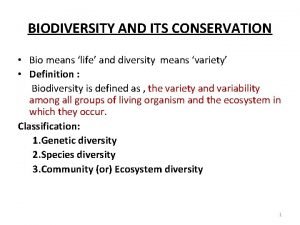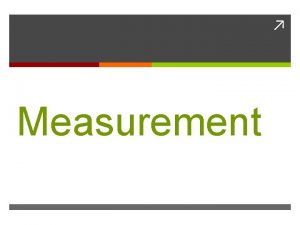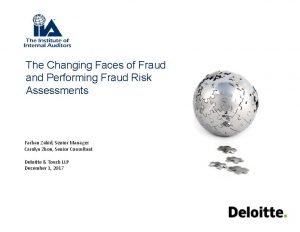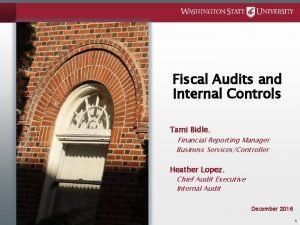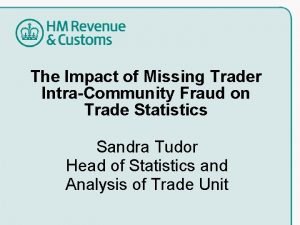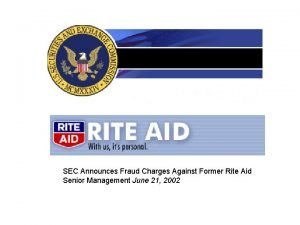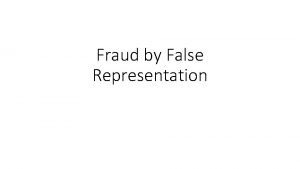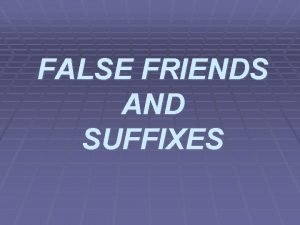Fraud Fraud means a false representation of fact














- Slides: 14

Fraud ü Fraud means a false representation of fact made willfully with a view to deceive the other party. ü Essential Elements of Fraud are ü By a party to a contract: The fraud by a stranger to a contract does not affect the validity of the contract. ü False representation: There must be false representation and it must be made with the knowledge of falsehood. ü Representation as to fact: The representation must relate to a fact. A mere opinion, a statement of expression or intention does not amount to fraud. ü Actually deceived: An attempt to deceive the other party by which the other party is not actually deceived, is not a fraud.

Fraud ü Mere silence is not fraud. ü Eg: If A sells, by auction, to B , a horse which A knows to be unsound. A says nothing to B about the horse’s unsoundness. This not a fraud. ü Although as a general rule mere silence or non-disclosure of facts do not amount to fraud, but in some exceptional cases keeping silence may de deemed to be an act of deception. 1. When there is a duty to speak, keeping silence is fraud. 2. When silence is, in itself, equivalent to speech, such silence is a fraud. ü Eg: , B says to A -- “if you don not deny it, I shall assume that the horse is sound. ” A says nothing

Misrepresentation ü when the person making a false statement believes the statement to be true and does not intend to mislead the other party to the contract it is known as “Misrepresentation”. ü Misrepresentation” means And includes— 1. the positive assertion, in a manner not warranted by the information of the person making it, of that which is not true, though he believes it to be true : 2. any breach of duty which, without an intention to deceive, gains an advantage to the person committing it, or any one claiming under him, by misleading another to his prejudice or to the prejudice of any one claiming under him ; 3. causing, however, innocently. A party to an agreement, to make a mistake as to the substance of the thing which is the subject of the agreement.

Mistake ü Mistake may be defined as an erroneous belief concerning something. It may be of two kinds. One, or both, of the parties may be working under some misunderstanding or misapprehension of some fact relating to the agreement. 1. Mistake by Law: A. Mistake of law of the country B. Mistake of foreign Law. 2. Mistake of Fact: A. Bilateral Mistake B. Unilateral Mistake.

4. Capacity to Contract ü Every person is competent to contract who is of the age of majority according to law which he is subject, and who is of sound mind, and is not disqualified from contracting by an law to which he is subject. ü Mental deficiency ü Mental Incompetents ü Idiots ü Lunatics ü Legal disability ü Alien Enemy ü Insolvent ü Convicts ü Drunkards ü Corporations (Doctrine of Ultra-Vires)

Minor’s Agreement (A) Enforceable Contracts • Contract for necessaries • Beneficial contract for service (B) Voidable Contracts • Contract which minor may enter or withdraw, if required (C) Unenforceable Contracts • Contract that a minor is unable to make Necessary Goods: Goods suitable for his condition in life, and to his actual requirements at the time of sale and delivery.

Minor’s Agreement 1. Agreement is Void ab-initio. However, the minor may enforce the agreement against the other party if he has carried out his obligation. 2. No Ratification: Minor cannot ratify the agreement on attaining the age of majority which he has entered into in minority age. 3. Minor can plead minority to avoid contract. 4. A minor is not liable to restore the property or goods. However, minor can be compelled if goods are traceable and in his possession, if minor has sold the goods then nothing can be claimed. 5. No Specific Performance: Actual contract is void ab initio, but if guardians entered into a contract if they have the authority and it is for the benefit of the minor, it is valid. 6. Minor can be a promisee or a beneficiary. 7. Minor as a partner: A minor cannot become partner in the partnership firm, but he can be admitted to benefits of partnership with consent of all the partners. The minor is liable for losses but not his personal property.

Minor’s Agreement 8. Minor as an agent: The principal shall be bound for the acts of minor agent. 9. Minor cannot be adjudged as insolvent. 10. Minor’s Liability for Necessaries 11. Position of Minor’s parents 12. Minor as a shareholder: A minor cannot be the shareholder but fully paid up shares may be transmitted to him through his lawful guardians. 13. Minor as an agent: The principal shall be bound for the acts of minor agent. 14. Minor cannot be adjudged as insolvent. 15. Minor’s Liability for Necessaries 16. Position of Minor’s parents 17. Minor as a shareholder: A minor cannot be the shareholder but fully paid up shares may be transmitted to him through his lawful guardians.

5. Lawful Consideration • Consideration is regarded as a price for which promise of the promisor is bought. • Subject to certain exceptions, agreements without consideration are void. Essentials of valid Consideration 1. Consideration must be moved or given at the desire of promisor: Acts done or services rendered voluntarily, or at the desire of the third party, will not amount to valid consideration so as to support a contract. 2. Consideration may be past, present or future 3. Consideration need not be adequate 4. Consideration must be real and not illusory 5. Consideration must be lawful 6. Consideration may move from the promisee or any other person

Exceptions to the rule , “ No Consideration, No Contract” 1. Any agreement, which satisfy the following conditions can be enforced by law without consideration 2. Promise to compensate for past voluntary consideration 3. Promise to repay time barred debt 4. Completed gifts and donations 5. Contract of a agency 6. Remission by the promisee of performance of the promise: Promise made by party for accepting lesser performance for the whole promise is valid without consideration.

6. Lawful Object • The object of an agreement is lawful, unless – 1. It is forbidden by law 2. Is of such nature that, if permitted it would defeat the provisions of any law or is fraudulent 3. Involves or implies, injury to the person or property of another 4. Court regards it as immoral 5. It is opposed to public policy. • In each of these cases, the consideration or object of an agreement is said to be unlawful. Every agreement of which the object or consideration is unlawful is void.

7. Agreement Expressively Declared Void 1. Agreements in restraint of marriage: An agreement in restraint of the marriage of any person, other than a minor, is void. • A agrees with B for good consideration that she will not marry C. It is a void agreement. • A agrees with B that she will marry him only. It is a valid contract of marriage. 2. Agreements in restraint of legal proceedings: • An agreement by which a party is restricted absolutely from taking usual legal proceedings, in respect of any rights arising from a contract. • An agreement which limits the time within which one may enforce his contract rights, without regard to the time allowed by the Limitation Act. • An agreement which provides forfeiture of any rights arising from a contract, if suit is not brought within a specified period, without regard to the time allowed by the Limitation Act.

7. Agreement Expressively Declared Void 3. Agreements in restraint of trade: Every agreement by which any one is restrained from exercising a lawful profession, trade or business of any kind, is to that extent void. • An agreement whereby one of the parties agrees to close his business in consideration of the promise by the other party to pay a certain sum of money is void 4. Agreements by way of wager: ‘wager’ means an ‘a bet’something stated to be lost or won on the result of a doubtful issue 8. Certainty of Meaning Agreements, the meaning of which is not certain, or capable of being made certain, are void. Eg: A agrees to sell to B “a hundred tons of oil”.

9. Possibility of Performance Agreements contingent on impossible events: Contingent agreements to do or not to do anything, if an impossible event happens, are void, whether the impossibility of the event is known or not to the parties to the agreement at the time when it is made. Agreements to do impossible acts: An agreement to do an act impossible in itself is void. 10. Legal Formalities Generally, a contract may be oral or in writing. However, certain contracts are required to be in writing and may even require registration. Therefore, where law requires an agreement to be put in writing or be registered, the same must be complied with.
 How do fraud symptoms help in detecting fraud
How do fraud symptoms help in detecting fraud ? true : false
? true : false True or false true or false
True or false true or false Fraus omnia vitiat
Fraus omnia vitiat Meta means in metamorphism
Meta means in metamorphism Meta and morph means
Meta and morph means Meaning of biodiversity conservation
Meaning of biodiversity conservation Triangle quadrilateral pentagon hexagon
Triangle quadrilateral pentagon hexagon Bio means 'life
Bio means 'life Chapter 7 fraud internal control and cash
Chapter 7 fraud internal control and cash Check kiting example
Check kiting example Computer fraud and abuse techniques
Computer fraud and abuse techniques Cressey fraud triangle
Cressey fraud triangle Missing trader intra-community fraud
Missing trader intra-community fraud Rite aid fraud
Rite aid fraud






